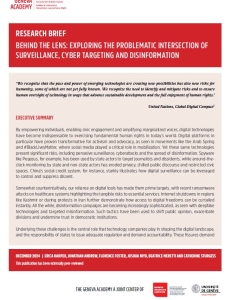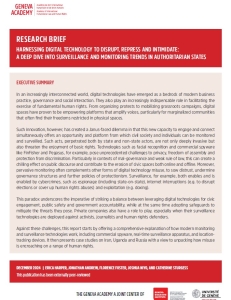Dr Jonathan Andrew conducts research on the nexus of human rights law with the development of neurotechnologies, emerging issues stemming from new technologies’ use in the military domain, and the deployment of dual-use technologies by law enforcement and border forces to monitor public assemblies and to manage transit and immigration.
Previously, he has worked as an advisor to UN Special Rapporteur on the Rights to Freedom of Peaceful Assembly and of Association Clément Voule on the impact of digital technologies on freedom of peaceful assembly and association and as a Senior Advisor to the Danish Institute for Human Rights, writing on the impact of investment finance for digitisation in emerging markets and developing civil society’s capacity to address online privacy violations. At the European University Institute (EUI) he completed his doctoral studies and worked as the Project Manager for SURVEILLE, a cross-disciplinary collaborative research project funded by the European Commission, where he focused on the impact of the surveillance of mobile devices on freedom of movement, assembly and association. Before joining the EUI, he was the Senior Legal Adviser with the Danish Refugee Council in Tajikistan. His professional experience includes consulting in IT, digital marketing and business process re-engineering.
Dr Andrew recently co-edited the book ‘Human Rights Responsibilities in the Digital Age’, published by Bloomsbury and has also published research on a wide array of fundamental rights topics, including mobility and privacy concerns relating to smart cities infrastructure developments and developing impact assessments on the Special Procedures of the Human Rights Council.
Dr Andrew holds a PhD in Public International Law from the European University Institute and was one of two lawyers awarded the Academy of European Law’s Diploma in 2008. His doctoral thesis examined the concept of locational privacy in relation to human mobility, focusing on how the classification and terminology of technologies influence the construct of legal metaphors in bridging gaps in applying existing context and precedent.






